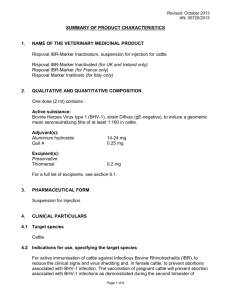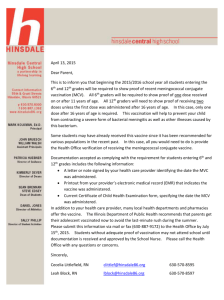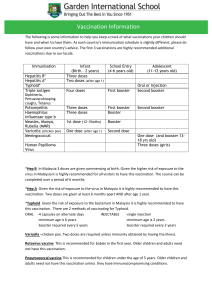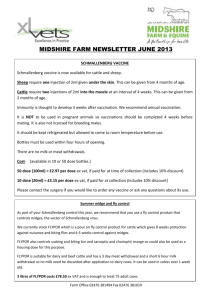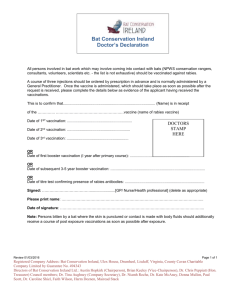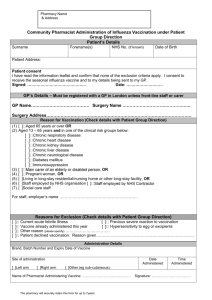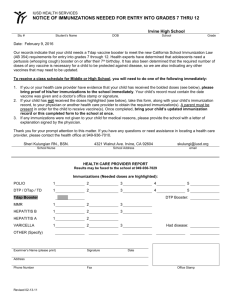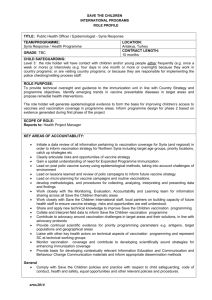Revised: July 2015 AN: 01271/2014 Summary of product
advertisement
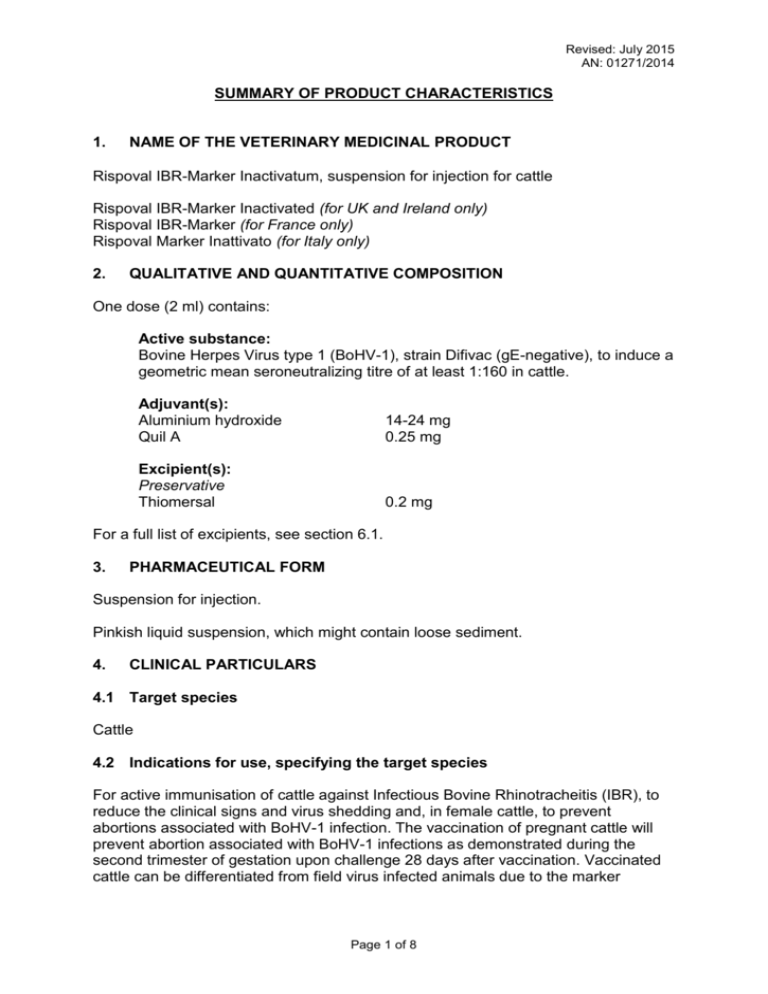
Revised: July 2015 AN: 01271/2014 SUMMARY OF PRODUCT CHARACTERISTICS 1. NAME OF THE VETERINARY MEDICINAL PRODUCT Rispoval IBR-Marker Inactivatum, suspension for injection for cattle Rispoval IBR-Marker Inactivated (for UK and Ireland only) Rispoval IBR-Marker (for France only) Rispoval Marker Inattivato (for Italy only) 2. QUALITATIVE AND QUANTITATIVE COMPOSITION One dose (2 ml) contains: Active substance: Bovine Herpes Virus type 1 (BoHV-1), strain Difivac (gE-negative), to induce a geometric mean seroneutralizing titre of at least 1:160 in cattle. Adjuvant(s): Aluminium hydroxide Quil A 14-24 mg 0.25 mg Excipient(s): Preservative Thiomersal 0.2 mg For a full list of excipients, see section 6.1. 3. PHARMACEUTICAL FORM Suspension for injection. Pinkish liquid suspension, which might contain loose sediment. 4. CLINICAL PARTICULARS 4.1 Target species Cattle 4.2 Indications for use, specifying the target species For active immunisation of cattle against Infectious Bovine Rhinotracheitis (IBR), to reduce the clinical signs and virus shedding and, in female cattle, to prevent abortions associated with BoHV-1 infection. The vaccination of pregnant cattle will prevent abortion associated with BoHV-1 infections as demonstrated during the second trimester of gestation upon challenge 28 days after vaccination. Vaccinated cattle can be differentiated from field virus infected animals due to the marker Page 1 of 8 Revised: July 2015 AN: 01271/2014 deletion, unless the cattle were previously vaccinated with a conventional vaccine or infected with field virus. Duration of immunity:6 months - For booster immunisation after primovaccination with Rispoval IBR-Marker Vivum (in member states where this product is authorized) to reduce the virus shedding and the clinical signs associated with BoHV-1 infection in cattle and, in female cattle, to prevent abortions associated with BoHV-1 infection. This vaccination of cattle will prevent abortion associated with BoHV-1 infections as demonstrated during the third trimester of gestation upon challenge 86 days after the booster vaccination. Duration of immunity: 6 months after complete primovaccination with Rispoval IBRMarker Vivum followed by 12 month after annual booster with Rispoval IBR-Marker Inactivatum. In order to prevent abortion in female cattle that have received basic immunisation, a single dose revaccination with Rispoval IBR-Marker Inactivatum is recommended to be applied no later than by the start of the second trimester of each further pregnancy. 4.3 Contraindications Do not use in unhealthy animals. 4.4 Special warnings None. 4.5 Special precautions for use Special precautions for use in animals None. Special precautions to be taken by the person administering the veterinary medicinal product to animals In case of accidental self-injection, seek medical advice immediately and show the package leaflet or the label to the physician. 4.6 Adverse reactions (frequency and seriousness) Transient subcutaneous swelling up to 5 cm in diameter, which subsides within 14 days, may occur at the injection site in very rare cases. In very rare cases allergic reactions may occur as with other vaccines, therefore vaccinates should be observed for approximately 30 minutes following immunisation. In those cases, antiallergics should be administered. The frequency of adverse reactions is defined using the following convention: very common (more than 1 in 10 animals displaying adverse reactions during the course of one treatment) common (more than 1 but less than 10 animals in 100 animals) uncommon (more than 1 but less than 10 animals in 1,000 animals) Page 2 of 8 Revised: July 2015 AN: 01271/2014 rare (more than 1 but less than 10 animals in 10,000 animals) very rare (less than 1 animal in 10,000 animals, including isolated reports). 4.7 Use during pregnancy, lactation or lay Can be used during pregnancy and lactation. 4.8 Interaction with other medicinal products and other forms of interaction Immunosuppressive substances, i.e. corticosteroids or Bovine Virus Diarrhoea modified live vaccines, should be avoided in a period of 7 days prior to and after vaccination as this may impair the development of the immunity. No information is available on the safety and efficacy of this vaccine when used with any other veterinary medicinal product. A decision to use this vaccine before or after any other veterinary medicinal product therefore needs to be decided on a case by case basis. 4.9 Amounts to be administered and administration route Posology The dose of vaccine is 2 ml for cattle over 3 months of age, for subcutaneous injection. The vaccination scheme consists of basic immunisation and booster vaccinations. Basic immunisation: Two injections of 1 dose (2 ml) each 3-5 weeks apart. Booster vaccinations of cattle having been administered the primary vaccination scheme using Rispoval IBR-Marker Inactivatum: 1 dose (2 ml) 6 months apart. Booster Vaccinations of cattle having been administered the primary vaccination scheme using Rispoval IBR-Marker Vivum (in member states where this product is authorized): Cattle having been administered the primary vaccination scheme using Rispoval IBR-Marker Vivum (according to the product information for this product) may be given booster vaccinations with Rispoval IBR-Marker Inactivatum. These animals should be given a single dose booster vaccination with Rispoval IBR-Marker Inactivatum 6 months after their initial vaccination course with Rispoval IBR-Marker Vivum. Thereafter, single dose booster vaccinations with Rispoval IBR-Marker Inactivatum should be administered every 12 months. If calves under the age of 3 months should be vaccinated the development of immunity may be impaired by maternal antibodies. These calves should be revaccinated when they are over 3 months of age. Page 3 of 8 Revised: July 2015 AN: 01271/2014 It is recommended to vaccinate all cattle of a herd. To prevent abortions associated with BoHV-1 female cattle require a primary course of two subcutaneous doses of vaccine 3-5 weeks apart or alternatively a primary course of a single intramuscular dose of Rispoval IBR-Marker Vivum followed 6 months later by a single dose booster using Rispoval IBR-Marker Inactivatum. In order to cover the main abortion risk period, it is recommended that the second dose of the primary course of two subcutaneous doses or the single dose booster using Rispoval IBR-Marker Inactivatum is administered no later than by the start of the second trimester of each pregnancy. Method of administration Shake the vaccine well before use. The liquid suspension is injected aseptically via the subcutaneous route. Vaccination schemes summary From 2 weeks to 3 months of age Rispoval IBR-Marker vaccine used Primary vaccination First dose, from Second dose, at 2 weeks of age 3 months of age (route of (route of administration) administration) Vivum (intranasal) Vivum (intramuscular) Vivum (intranasal) Vivum (intramuscular) Page 4 of 8 Revaccination intervals Interval to next booster vaccination (vaccine and route of administration) 6 months (Vivum, intramuscular) 6 months (Inactivatum, subcutaneous) All subsequent booster vaccinations (vaccine and route of administration) 6 months (Vivum, intramuscular) 12 months (Inactivatum, subcutaneous) Revised: July 2015 AN: 01271/2014 From 3 months of age Rispoval IBR-Marker vaccine used Primary vaccination (number of doses and route of administration) Vivum (one dose, intramuscular) Vivum (one dose, intramuscular) Inactivatum (two doses, subcutaneous, with 3-5 week interval) Revaccination intervals Interval to first booster vaccination (vaccine and route of administration) 6 months (Vivum, intramuscular) 6 months (Inactivatum, subcutaneous) 6 months (Inactivatum, subcutaneous) All subsequent booster vaccinations (vaccine and route of administration) 6 months (Vivum, intramuscular) 12 months (Inactivatum, subcutaneous) 6 months (Inactivatum, subcutaneous) For female cattle for protection against abortion: Rispoval IBR-Marker vaccine used Vaccination schedule (number of doses and route of administration) recommended to be applied no later than by the start of second trimester of pregnancy Vivum (two doses, intramuscular, with 3-5 weeks interval) Vivum (one dose, intramuscular) followed by Inactivatum (one dose, subcutaneous), with 6 months interval Inactivatum (two doses, subcutaneous, with 3-5 week interval) Revaccination Inactivatum (one dose, subcutaneous) recommended to be applied no later than by the start of the second trimester of each pregnancy Page 5 of 8 Revised: July 2015 AN: 01271/2014 For vaccination in known high BoHV-1 infection pressure: Rispoval IBR-Marker vaccine used Primary vaccination (number of doses and route of administration) Vivum (one dose, intranasal), followed by Vivum (one dose, intramuscular) with 3-5 weeks interval Revaccination intervals Interval to first booster vaccination (vaccine and route of administration) 6 months (Vivum, intramuscular, OR Inactivatum, subcutaneous) All subsequent booster vaccinations (vaccine and route of administration) 6 months (Vivum, intramuscular) OR 12 months (Inactivatum, subcutaneous) 4.10 Overdose (symptoms, emergency procedures, antidotes), if necessary Reactions after administration of a double dose of vaccine are not different from those after the single dose. 4.11 Withdrawal period(s) Zero days. 5. IMMUNOLOGICAL PROPERTIES Inactivated viral vaccine. ATCvet code: QI02AA03 The vaccine induces immunity in cattle against clinical respiratory symptoms caused by the Infectious Bovine Rhinotracheitis (IBR) virus. Following infection the intensity and duration of clinical symptoms as well as the titre and duration of virus shedding are significantly reduced. As with other vaccines, vaccination may not completely prevent but does reduce risk of infection. The product induces in vaccinated cattle antibodies, which are detected in the serum neutralisation test and in conventional ELISA tests. With specific test kits these antibodies can be differentiated - due to the lack of antibodies against gE - from those of field virus infected animals or animals vaccinated with conventional vaccines. 6. PHARMACEUTICAL PARTICULARS 6.1 List of excipients Phenolsulfonphthalein HEPES-Na Sodium thiosulfate Thiomersal Minimum Essential Medium Page 6 of 8 Revised: July 2015 AN: 01271/2014 6.2 Incompatibilities Do not mix with any other veterinary medicinal product. 6.3 Shelf life Shelf-life of the veterinary medicinal product as packaged for sale: 36 months Shelf-life after first opening the immediate packaging: 8 hours 6.4 Special precautions for storage Store in a refrigerator (+2°C to +8°C). Protect from frost, heat or light. 6.5 Nature and composition of immediate packaging Multidose containers: 10 doses: 1 glass vial with 20 ml (10 doses) inactivated vaccine, closed with bromobutyl rubber stoppers and sealed with an aluminium ring with a flip-off cap, packed as 1 vial in a folding carton. 50 doses: 1 glass vial with 100 ml (50 doses) inactivated vaccine, closed with bromobutyl rubber stoppers and sealed with an aluminium ring with a flip-off cap, packed as 1 vial in a folding carton. Not all pack sizes may be marketed. 6.6 Special precautions for the disposal of unused veterinary medicinal product or waste materials derived from the use of such products Any unused veterinary medicinal product or waste materials derived from such veterinary medicinal products should be disposed of in accordance with local requirements. 7. MARKETING AUTHORISATION HOLDER Zoetis UK Limited 5th Floor, 6 St. Andrew Street London EC4A 3AE 8. MARKETING AUTHORISATION NUMBER Vm 42058/4127 9. DATE OF FIRST AUTHORISATION 05 February 1999 Page 7 of 8 Revised: July 2015 AN: 01271/2014 10. DATE OF REVISION OF THE TEXT July 2015 10 September 2015 Page 8 of 8
